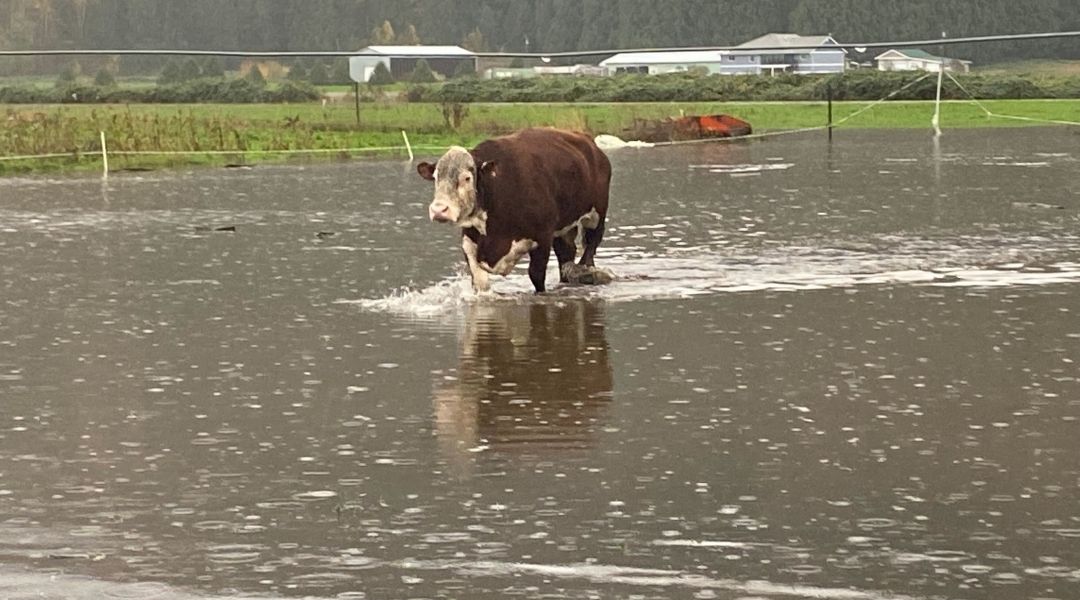
Below are updates and resources for agricultural producers who have been affected by the recent floods in BC.
Quick links:
- Fuel Prioritization Order
- Veterinarians Assisting with Flood Victims
- Mass Carcass Removal for Affected Farms
- Mental Health Support
- Request: Accommodations for Displaced TFWs
- Emergency Logistics: Routing Your Products Through the US
1. Fuel Prioritization Order
The BC government has placed temporary restrictions on vehicle fuel purchases and travel in areas impacted by flooding. The government has confirmed that essential vehicles include commercial transport trucks for critical goods and services including food and beverage, health care and safety; as well as grocery delivery, refrigerated trucks, agriculture and farm-use vehicles and veterinarians supporting flood response. These vehicles will not have fuel limits and will be able to access gas at commercial trucking gas stations. See Travel and fuel restrictions – Province of British Columbia.
The temporary fuel restriction has been put in place due to a very real need to temporarily ration fuel. The agriculture sector’s exemption has been granted because of the critical service it provides and based on trust that the sector will act in good faith around the spirit of the exemption.
Updates and the request for an Agriculture Essential Vehicle Certification can be found at the Ministry’s Flood Emergency webpage.
2. Veterinarians Assisting with Flood Victims
Please see this list of veterinarians available to support given the recent flooding events.
3. Mass Carcass Removal for Affected Farms
Deadstock storage for flood-affected farms:
The Ministry urges producers to manage their mortalities within the barn structure until a disposal plan is in place. Storing the carcasses in the barn reduces biosecurity risk in two ways:
- It reduces the attraction of scavengers and predators onto your farm. These animals can introduce diseases, including avian influenza to your property.
- It reduces the risk of disease spread from the carcasses to other areas of your property or to your neighbours.
Other considerations:
- Producers are ultimately responsible for their mortalities, and securing those mortalities in the event of rising water could be difficult if not stored in a barn or other secure structure.
- Live animals should be segregated from deadstock where possible. If this is not possible within the barn, the Ministry recommends that the producer move and contain the live animals outside of the barn, under a tarp or in an otherwise secured way.
Deadstock disposal options:
The Ministry of Agriculture team within the Emergency Operations Center is coordinating transport and disposal of livestock carcasses. You can call the Ministry Livestock Carcass Disposal Hotline at 604-302-4830 and a staff member will help to facilitate the removal of any carcasses that may be on your farm. You do not have to be on the farm to make the call.
4. Mental Health Support
Please see the following mental health resources:
- AFF – Mental Health Resources (PDF)
- AgSafe’s new Mental Wellness Resource/App, called Avail
- We have permission from AgSafe to share their new Mental Wellness Resource/App, called Avail. Avail is not yet public on AgSafe’s Mental Wellness page (it will be released on Dec 1st), but it is active now/available for producers & we have permission to share.
- Read the Avail Handbook here (PDF)
- Health Emergency Management BC (HEMBC) Requesting Telephone Support (PDF)
- Health Emergency Management BC website: http://www.phsa.ca/our-services/programs-services/health-emergency-management-bc
- Permission to share from PHSA Team
5. Accommodations for Displaced TFWs
Over the weekend, about 200 TFWs (150 SAWP and 50 AgStream) are in emergency evacuation centers. As water levels drop and employers assess the condition of their farms, some workers may not be able to return to their homes. As such, WALI is looking for farms on the Abbotsford and Chilliwack sides of the flood who are willing to house workers until long term solutions are found.
Please let Reg Ens (rens@walicanada.ca) know if you have a farm that might be willing to assist. They are also supporting workers who have lost personal belongings in the flood.
6. Emergency Logistics: Routing Your Products Through the US
CFIA and CBSA announced interim special measures to allow for goods to flow in-transit through the US. The standard requirements to electronically file a manifest and carry a bonded status have been waived and the measures require border entry/exit at specific crossings (Bellingham included). View the full protocols here (PDF).

